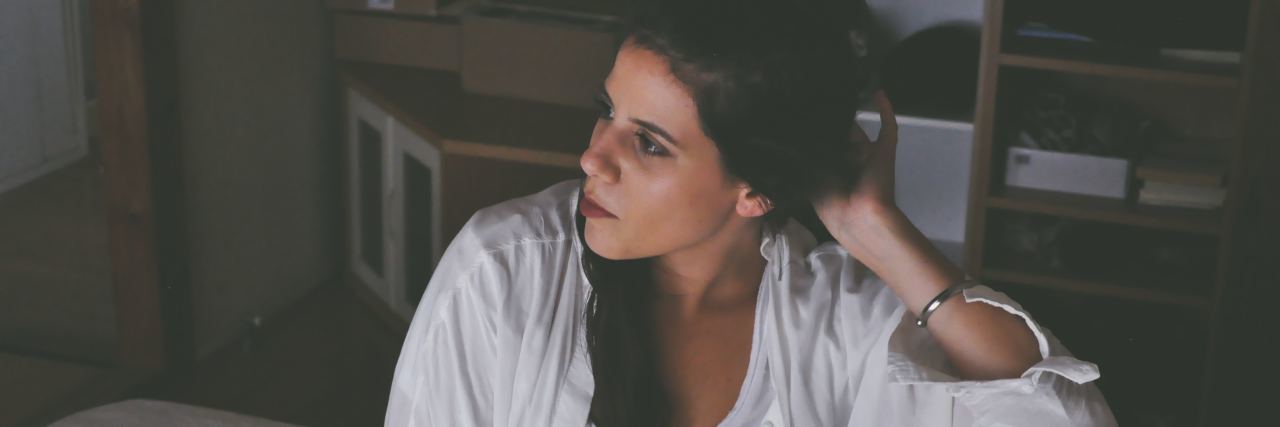What It's Like to Live Without a Parent by Choice After Trauma
Well, this is a personal one, isn’t it? You know me: I’ve not been too afraid to air my “dirty laundry” on my blog and I’ve documented my whole mental health experience, therapy, medication, all of it — but somehow this one seems more personal still. It’s a strange subject to bring up. When people hear your mother isn’t around, they assume she’s dead. She isn’t dead, but it’s a different kind of loss and a different kind of grief.
After a troubling time at a young age, it was decided I would live with my dad and inevitably my relationship with my mum lacked because of that. But in the end, it lacked in a completely irreversible way. We both found it difficult: I was scared of my mum and the people she associated with, the things that had happened, the things that would happen and I’d started to show symptoms of post-traumatic stress disorder (PTSD) from what was, frankly, a worryingly young age (although I didn’t know it, of course). I was worried to spend time with her, and in the end, she gave up trying to get me to feel better about it.
I was about 7 on the last day I saw her in the organized visits we’d had set up.
I found her again about 10 years later, having looked for her on the basis that I wanted answers from her and following the complete realization I didn’t have a bloody clue what my own mum was like. Not properly. Not as a person. So, I found her, met up with her and saw her on and off for bit. I didn’t know I had PTSD until it flared up more than ever when I was about 18, which encouraged me to seek help. During my second attempt at therapy — and the one that worked — my (fabulous) therapist told me she truly believed I wouldn’t get better if I was still in contact with my mother. It wasn’t healthy and she wasn’t good for me: she brought out the tiny version of me inside who was anxious and prone to panic.
My therapist told me a key part of recovery for PTSD is separating yourself from anything related to the trauma — literally, physically — where possible, and at the point of being willing to try anything at all to get better, I decided this was what I had to do.
I haven’t spoken to my mother since. There wasn’t a final conversation, a goodbye, an anything. She was just gone, again.
It was alright. It wasn’t a difficult decision to make, which sounds awful, but having not had a relationship with her for so many years, having it break down again wasn’t too much of a problem for me. It was a shame, and the idea of being better off without a parent is tough, but I didn’t have a huge amount to lose. Life would just continue as I’d always known it.
And it did. I really like my life. Genuinely. Now, anyway. It’s taken a while to get there, but I’m really comfortable with where I am. However, there is always this thing hanging over me. It’s not overpoweringly negative, sometimes it’s not negative at all, and it doesn’t impose on every day. But sometimes it’s a huge reminder that comes crashing in: Firstly, that my mum gave up on me, but secondly, there’s a woman out there somewhere who is my biological mum and I’m pretty certain I will never see her again. She won’t be at my wedding, she has no idea of my achievements, who I am, what I’m like, when I have a medical appointment, when I’m down, scared, anxious, when things go wrong — or right. I have no photos, no solid memories, just the knowledge of an absence.
Of course, this has been mostly my choice. Maybe I’d still be seeing her now if I’d made a different decision with my therapist. And I’m not in any way ungrateful for the life I’ve had and the people who brought me up, but it will never change the strange feeling of loss or wonderment about it or her because, unfortunately, that’s biology.
Every day, I thank myself for putting myself first and I’m comfortable I made the right choice. Loss is something you grow to live with and I guess that’s what I’ve done, in some kind of way.
I’ve come to understand this isn’t as uncommon as I’d always thought and I needn’t feel as isolated as I have in the past. Stereotypically, it’s dads who leave, if anyone, and generally people’s mums are the most important person in their lives — they couldn’t imagine living without them.
But since I started publishing my work on The Mighty, I’ve found and taken part in conversations about cutting out mums, being left by mums, feeling left by mums and then I discovered Mother Wound Project: an Instagram account dedicated to validating people whose mums are basically a letdown.
I wouldn’t describe it as a “normal” thing, and that can be isolating. And I’m sure people will continue to assume my mother is dead if the conversation arises, because mothers don’t leave their children and all that jazz. But hey, they do. And some people leave their mums. It is what it is.
A version of this story was originally published on Little Thoughts.
Unsplash image by Priscilla du Preez

